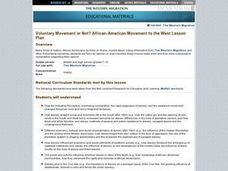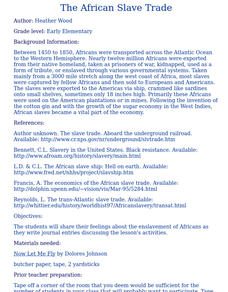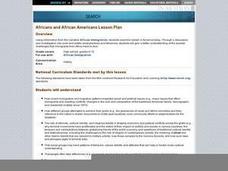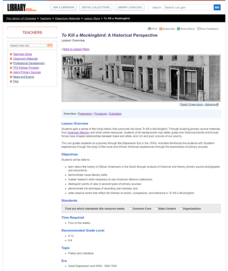Core Knowledge Foundation
Isn’t It Exciting? (The American Industrial Revolution and Urbanization)
America was built on the ingenuity, work ethic, and foresight of our ancestors. Sixth graders learn about the complex Gilded Age in American history, including the prominent inventors and captains of industry, and how they all connect...
Curated OER
Diverse Voices - African American Ventures
Students research African American history and the Underground Railroad. In this African American history lesson, students discuss the Drinking Gourd. Students read 'If You Traveled the Underground Railroad' and discuss. Students work in...
Curated OER
Voluntary Movement or Not? African-American Movement to the West
Learners form an opinion on how voluntary African-American moves really were and then write a persuasive composition supporting their opinion. They access a multi-media narrative imbedded in this plan.
Curated OER
Race and Voting in the Segregated South
Learners examine the history of African American voting rights. In this voting rights lesson, students listen to a lecture on African American voting rights between the years 1890 and 1965. Learners respond to discussion questions...
Curated OER
The Harlem Renaissance: Black American Traditions
Students examine the time period of the Harlem Renaissance. As a class, they are introduced to five artists and discuss their art and techniques. Using the internet, they also research the philosophers of the time period and how...
Roy Rosenzweig Center for History and New Media
The Revolutionary Times as Seen Through the Eyes of Women
The role of women before and during the American Revolution changed dramatically. To gain an understanding of these changes, middle schoolers analyze primary source documents, including letters from women that supported the patriot cause...
PBS
Jackie Robinson's Complicated — and Important — Legacy
Americans tend to lock their heroes in history, holding these icons to a particular event or time. Jackie Robinson is such a hero, remembered by most for becoming the first African American to play in the Major Leagues. Young historians...
Los Angeles Unified School District
Why Is the Declaration of Independence Important?
Fair or unfair? To begin a study of the American Revolution, class members review the treatment of the people of the American Colonies by the King of England and decide which were fair and which were unfair. Class members then annotate a...
Curated OER
Sojourner Truth
Students research Sojourner Truth. In this African-American history lesson, students read the speech "Ain't I A Woman?" and brainstorm descriptive words that describe Sojourner Truth. Students discuss why her acts were considered...
Curated OER
The African Slave Trade
Students share their feelings about the enslavement of Africans as they write journal entries discussing their role play activity.
Curated OER
Africans and African Americans
Students complete small group tasks related to racism as it applies to African Americans, African immigrants, and white immigrants. Through discussion of their findings, students explain of challenges in society that African immigrants...
World of Teaching
Black History Month 2008
A list of prominent African-Americans and their accomplishments makes up this presentation on Black History Month. Leaders in sports, the arts, science, and entertaining will help viewers connect with the voluminous contributions of the...
Curated OER
Narrative of the Life of Frederick Douglass: An American Slave by Frederick Douglass
In this literature worksheet, students respond to 12 short answer and essay questions about Narrative of the Life of Frederick Douglass: An American Slave. Students may also link to an online interactive quiz on the novel at the bottom...
University of Richmond
The Forced Migration of Enslaved People 1810-1860
Slavery not only involved the forced migration of African people from their homes, it also meant the forced removal of people within the United States. Using data and interactive graphics, scholars see how the tragedy of human slavery...
Curated OER
Pizza Biography
A biography writing lesson with a tasty twist! Kids create a "visual biography" in which each pizza slice represents a paragraph, and toppings represent supporting details. They learn research techniques, note-taking skills, and how to...
Alabama Department of Archives and History
Two Different African-American Visions: W.E.B. Du Bois and Booker T. Washington
The strategies civil rights activists Booker T. Washington and W.E.B. Du Bois proposed for blacks to achieve racial progress is the focus of an activity in which class groups identify the strategies as well as the benefits and drawbacks...
Alabama Department of Archives and History
The Wrong Side of History: How One Group Justified Its Opposition on the Freedom Riders and Civil Rights for African Americans
Designed as a supplement to the study of the Freedom Riders, this resource uses primary sources to reveal the views of those who opposed the Freedom Riders. After careful study of the arguments presented by the members of the Montgomery...
K12 Reader
Song of Freedom: Go Down, Moses
African American spirituals served as more than songs of religious praise during the years of slavery. "Go Down, Moses" is featured on a activity that asks readers to respond to a series of short-answer prompts about the spiritual.
Curated OER
The History of African-American Children: A Guide for Teaching Black History at the Elementary School Level
How do you introduce the topic of slavery to your youngest learners? The Sneetches, by Dr. Suess, is a great introduction to the idea of being different. Read the story to your class, and discuss desegregation in public buildings. This...
Curated OER
The Harlem Renaissance Births a Black Culture
Students examine the men and women who were a part of the Harlem Renaissance. Individually, they recreate their favorite pieces of art from the time period and create their own original works after reading poem from the movement. In...
Curated OER
Underground Railroad Mini-Unit
Students watch a film about slavery. Students view a PowerPoint about the Underground Railroad and use various resources to make a timeline for the topic. Students research a historical figure from the Underground Railroad era and give a...
Curated OER
Kwanzaa Window Book
Learners research Kwanzaa, focusing on the seven principles used in celebration, with an artistic lesson. They design their own window books to demonstrate comprehension of the principles and symbols of Kwanzaa in words and pictures.
Curated OER
Bulletin Board Patterns: The Seven Principles of Kwanzaa
Enhance your Kwanzaa celebration with bulletin patterns that identify the seven principles of Kwanzaa, provide a pronunciation guide, and a brief explanation of the principle. A great way to encourage Umoja.
Library of Congress
To Kill A Mockingbird: A Historical Perspective
Students study the novel, To Kill a Mockingbird. Through studying primary source materials from American Memory and other online resources, students of all backgrounds study the relationships between blacks and whites.
Other popular searches
- Famous African Americans
- Free African Americans
- Rap and African Americans
- Aids and African Americans
- Displaced African Americans
- Famous African Americans
- African Americans in History
- Free African Americans
- African Americans Today
- Wwii African Americans
- African Americans and Wwi
- African Americans in History

























